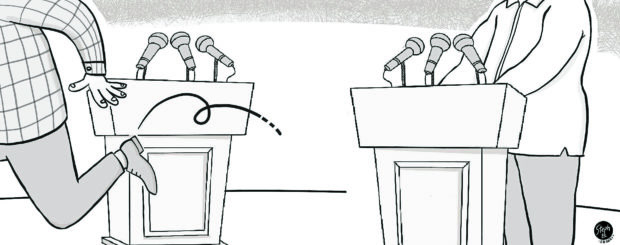Lost chance for clarity

On April 27, the Philippine Coast Guard (PCG) issued a radio challenge to several Chinese ships anchored in Sabina Shoal west of Palawan: “To unidentified foreign vessels at Sabina Shoal. This is Philippine Coast Guard. We are BRP Cabra (MRRV-4409). You are within the Philippine exclusive economic zone. You are requested to provide the following: name of vessel, intention, last and next port of call on Channel 16.”
The radio challenge spooked the Chinese vessels, which scampered away. It was a heroic move by the PCG, joined by the Bureau of Fisheries and Aquatic Resources. For the first time under the Duterte administration, the country’s maritime patrol successfully drove away Chinese trespassers from Philippine waters, and without incident.
Article continues after this advertisementHow tragic, then, that this singular act of courage and patriotism by our maritime defenders was negated just days later when the President and commander in chief issued his most profoundly disturbing statement yet — calling the 2016 Arbitral Award won by the Philippines against China a mere scrap of paper: “Actually, to speak crassly, if you give it to me, I’ll tell you it’s just paper. I’ll throw it into the wastebasket.’’
What was “just paper’’ to Mr. Duterte was the landmark ruling that upheld Philippine sovereign rights over features in the West Philippine Sea (WPS) and invalidated China’s nine-dash-line claim. As over 200 Chinese ships swarmed Julian Felipe Reef near Palawan in March, countries like the United States, the United Kingdom, Germany, Australia, Japan, and the European Union all reprimanded China’s incursions by pointedly invoking the 2016 Award.
That ruling was precisely what also armed the valiant PCG and BFAR team to drive away the Chinese vessels from the Philippine EEZ.
Article continues after this advertisementIn his speeches and weekly addresses on TV, Mr. Duterte has let loose a stream of assertions and views on the WPS that essentially favored an acquiescent posture to Beijing’s grasping moves: that a small country like the Philippines cannot challenge mighty China, that asserting its sovereign rights already upheld by a treaty-created tribunal in charge of settling disputes between nations would lead only to war, that the Philippines owed China a “debt of gratitude,” among others.
As he imposed this troubling narrative on the nation, one that posed grave implications to the Philippines’ national interests and international standing, no one dared fact-check the President in real time, certainly not his Cabinet officials who contented themselves with mopping up and trying to spin afterwards the inconsistencies and misrepresentations that riddled their principal’s rhetoric.
So what a golden opportunity it would have been to directly examine the President’s thinking when, last week, in a fit of anger, Mr. Duterte dared former Supreme Court senior associate justice Antonio Carpio to a debate—and Carpio forthwith accepted the challenge. The President had lashed out at Carpio and former foreign secretary Albert del Rosario for pressing him to uphold the Arbitral Award as China continued its provocations in the WPS.
Alas, Mr. Duterte just as soon backed out from his own challenge, sending his mouthpiece Harry Roque to proxy for him instead. But what was the point, when Roque and his boss have been known to speak at cross-purposes? The President, for instance, had claimed he had a “verbal agreement” with Chinese President Xi Jinping allowing Filipino fishermen to enter Scarborough Shoal in exchange for China fishing in the WPS. Roque, however, denied that any such “verbal agreement” exists.
That glaring contradiction could have been clarified once and for all in a Duterte-Carpio debate, along with other contentious presidential claims, the most dangerous of which is that China “is in possession” of the WPS. Also, and no less jarring, Mr. Duterte’s statement that Xi had supposedly assured him of protection in case of a coup. Even the President’s latest head-scratching denial—that “I did not promise I would pressure China” and that “I never mentioned (anything) about China and the Philippines in my campaign”—would have been promptly corrected, the voluminous record from just five years ago attesting otherwise. He did make such a promise, and dramatically at that, vowing to ride a jet ski to the Spratlys and planting the Philippine flag there. “Then I would say, ‘This is ours and do what you want with me,’” then candidate Rodrigo Duterte had thundered.
How illuminating it would have been for the country to see the President reminded of the words he had said, and asked why he has all too clearly changed his mind. Sheepishly backing out from the debate he himself had initiated was a lost opportunity for the nation’s leader to explain himself more fully and thoughtfully, such as it is. Perhaps because, ultimately, he and his administration saw there was precious little on their side to win this argument?
For comprehensive coverage, in-depth analysis, visit our special page for West Philippine Sea updates. Stay informed with articles, videos, and expert opinions.
















